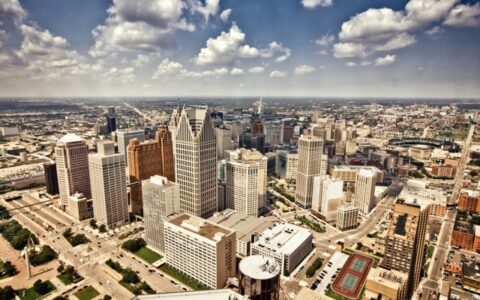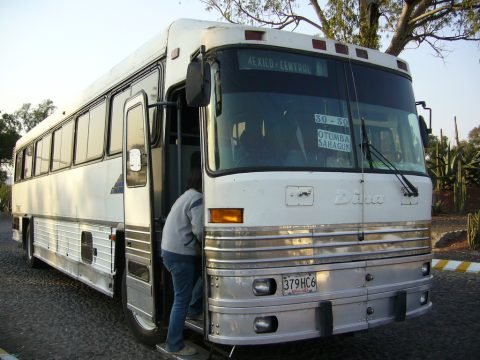Economics

Fremont’s Anti-Immigrant Ordinance Out of Step with Other Cities in Nebraska
Last week, the residents of Fremont, Nebraska voted to keep a 2010 anti-immigrant housing ordinance on the books. While the small town, with a seven percent foreign born population, has chosen to continue down its current path of exclusion, other places in Nebraska are pursuing inclusive strategies… Read More

Farm Bureau Warns Enforcement-Only Immigration Reform Would Harm America’s Food Supply
The on-the-ground harm of enforcement-only state immigration policies is clear. The “self-deportation” style laws in Arizona, Alabama, and Georgia all dealt severe blows to the states’ economies, particularly the agricultural industries. A federal enforcement-only approach to immigration reform would have a similarly harmful impact, leading… Read More

Fremont, Nebraska Has More to Gain from Welcoming Immigrants
Fremont, Nebraska, has become ground zero for one of the longest-standing anti-immigrant experiments in the United States. In 2010, the small, Midwestern town of 26,000 voted on an ordinance that would create unwieldy and costly housing permits to verify the immigration status of all Fremont renters and would… Read More

Michigan to Immigrants: You’re Welcome Here
It is clear that Michigan Gov. Rick Snyder understands that immigration can be a potent boost to his state’s economy. It’s also an important component of economic revitalization for a city such as Detroit. Improving the nation’s broken immigration system could have enormous economic benefits for Michigan and states across the country, so Snyder joined former New York City Mayor Michael Bloomberg and former Secretary of Commerce Carlos Gutierrez, in Washington Friday to continue urging lawmakers to overhaul the U.S. immigration system. As Gutierrez explained, “Our laws aren’t serving our economy.” And Bloomberg noted that it is terrible economic policy to turn away foreign born entrepreneurs and innovators while also making it difficult for foreign-born graduates to remain in the country after earning degrees from our colleges and universities. State leaders recognize this as well, but they also know upgrading immigration laws requires congressional action. “We need comprehensive immigration reform. Bottom line,” Snyder said Friday. “To be blunt, we have a dumb system.” Read More

Immigrant Entrepreneurs Driving Growth in America’s Heartland
When Jordi Carbonell, originally from Spain, and his wife Melissa Fernandez opened their Cafe Con Leche coffee shop several years ago in southwest Detroit, the couple founded their business on the idea that the neighborhood needed a central gathering place to create a strong community. Today,… Read More

New Study Highlights Causes of Return Migration to Mexico
Mexicans and Americans Thinking Together (MATT) has presented the results of a new study that highlights some recent, significant shifts in return migration from the United States to Mexico. One of the merits of this study is that it reminds us of the dynamic and bi-directional nature of migratory flows between the two countries. Between 2005 and 2010, 1.39 million people moved from the U.S. to Mexico, of whom 985,000 were returning migrants. Interestingly, deportations (which, as we know, have escalated tremendously during the Obama administration) represent only 11% of all return migrants to Mexico in that period. This means that a significant number of return migrants “chose” to go back to Mexico voluntarily. Read More

Immigrant Entrepreneurs are Investors in their Communities
Cedric Francois, a medical researcher from Belgium, came to Louisville, Kentucky, after hearing that researchers there were beginning work on the first hand transplant. Later, he co-founded two pharmaceutical companies. Suhas Kulkarni, an immigrant entrepreneur himself who founded Louisville-based IT firm Omnisys, understands the need for integrating and helping immigrant entrepreneurs get their start and is leading the area’s new Refugees and Immigrants Succeeding in Entrepreneurship (RISE) initiative. This is a collaborative effort among public and private organizations to support immigrants and refugees in the entrepreneurial endeavors in the Louisville area. RISE recognizes that Louisville “has an untapped pool of talent for city-wide economic development in the form of immigrants and refugees” and that “this population has the potential of becoming drivers of economic growth” for the region. Immigrant entrepreneurs are often vital assets in communities. They start businesses, create jobs, and encourage community revitalization efforts. Immigrant businesses can help revive dilapidated or aging retail corridors. And they provide an opportunity for immigrants to reinvest in the area. Take for example Vilmar Zenzen, originally from Brazil, who is opening a new upscale Brazilian steakhouse in downtown Louisville. Zenzen already operates another Brazilian steakhouse in Knoxville, Tennessee. Read More

How Immigrants on a Pathway to Citizenship can Revitalize Rust Belt Cities
Like Rust Belt cities such as Baltimore and Detroit, rural towns across America have experienced population declines in recent decades. Some places, however, are an exception to that trend thanks in part to the arrival of immigrants. For example, while other Iowa towns experienced population decline over the past several decades, West Liberty’s population grew because of immigration. As Steve Hanson, superintendent of West Liberty Community School District, notes, “in the last 20-30 years we would have had a population decline if we hadn’t had immigrants come in [for] jobs in the food manufacturing business. They provide a source of labor that wouldn’t have been there.” And West Liberty’s Mayor, Chad Thomas, said immigration has “kept a lot of storefronts and businesses open that probably otherwise would have closed.” Read More

Dollars and Lives Lost in the Wait for Immigration Reform
Two-and-a-half months after the Senate passed immigration reform legislation (S. 744), the House of Representatives continues to dawdle. Other than giving speeches and mulling over a few backward-looking, enforcement-only bills, the House has done nothing to revamp the broken U.S. immigration system or to realistically resolve the status of the 11 million unauthorized immigrants now living in the United States. The standard excuse for this inaction is that there are too many other high-priority items on the legislative agenda right now—so immigration reform will have to wait. But while Congress waits, dollars and lives are being lost. Read More

Months After Passage, Anti-Immigrant Group Still Mischaracterizes Senate Bill
The immigration reform bill (S.744) that the Senate passed in June would fix our broken work visa programs for lower skilled, higher skilled, and agricultural workers; eliminate decades-long backlogs in our immigrant visa programs; increase job and wage protections for U.S. workers; and greatly increase our investment in border security. In addition, the bill would have fiscal and economic effects that would be overwhelmingly positive, according to the Congressional Budget Office (CBO). If enacted, the bill would help reduce the federal budget deficit by approximately $1 trillion over 20 years, would boost the U.S. economy as whole without negatively affecting U.S. workers, and would greatly reduce future undocumented immigration, according to the CBO. However, the Federation for American Immigration Reform (FAIR) released a report this week criticizing the bill. They claim S.744 offers an immediate “amnesty” for the undocumented, lacks specific metrics for measuring border enforcement, weakens the visa entry-exit system, and creates a “nebulous new system” that fails to protect Americans from illegal foreign workers. Read More
Make a contribution
Make a direct impact on the lives of immigrants.
